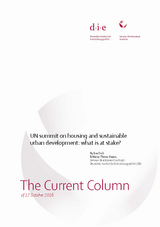UN summit on housing and sustainable urban development: what is at stake?
Dick, Eva / Maria-Theres HaaseThe Current Column (2016)
Bonn: German Development Institute / Deutsches Institut für Entwicklungspolitik (DIE) (The Current Column of 17 October 2016)
Bonn, 17 October 2016. Habitat III, the United Nations Conference on Housing and Sustainable Urban Development, will be held in Quito, Ecuador from 17 to 20 October 2016. Key decisions will be taken in this forum about the next few decades of urban life. It is being dubbed the “implementation conference”, coming in the wake of the adoption of the 2030 Agenda for Sustainable Development and the Paris Climate Agreement. If it is to live up to this title, then delegates in Quito must lay the foundations for the localisation of the Sustainable Development Goals, that is, their implementation and the monitoring of their effectiveness in cities and municipalities.
Cities play a central role in sustainable development worldwide. Over half of the world’s population already lives in cities, and this proportion is set to rise to two thirds by 2050. 90% of the urban popu-lation increase forecast by 2050 is expected to take place in emerging economies and developing countries. Much of the infrastructure for meeting these people’s needs must still be built if global poverty reduction goals are to be achieved. However, if urban construction and city planning continue in the mould of recent decades, then we will use up an increasing amount of land and resources, making it impossible to limit global warming to two degrees Celsius.
Only a very small number of cities have the resources to help resolve such complex global development issues. Developing countries and emerging economies in particular often lack expertise and decision-making skills at local level due in many cases to inadequate general legal and financial conditions for decentralisation and municipal self-government. In most countries, the interests of civil-society and grass-roots groups are rarely accounted for sufficiently in the urban development process. Very limited use is made of opportunities for cooperation with the private sector, for example in the fields of climate change mitigation and adaptation, and digitisation. International policy-making processes also fail to take sufficient consideration of cities. The interests of small and medium-sized cities are particularly neglected, even though they are experiencing the most rapid growth and therefore facing particularly great challenges in terms of ensuring basic supplies, integration and social cohesion for their populations.
Habitat III offers a real opportunity to raise awareness internationally of the development relevance of cities and to take account of them in future action strategies for sustainable development. This is reflected in the conference process. For the first time, the conference preparation phase allowed cities to make a comprehensive contribution to negotiations on the draft outcome document: the New Urban Agenda. At the conference itself, there will be numerous events focusing on issues of implementation, many of them organised on the initiative or with the involvement of urban actors.
At the same time, the strong development weighting accorded to local urban actors is also reflected in the final draft content for the New Urban Agenda, which sees itself as contributing to the local and participatory implementation of Agenda 2030. It further calls for favourable framing conditions at all levels of government and administration, for example decentralisation and subsidiarity. Processes for monitoring progress in the implementation of the New Urban Agenda shall be linked to the results monitoring mechanism of Agenda 2030. Local governments are also recognised here as active partners in the process.
However, in the absence of clear statements and details regarding localisation, that is the implementation of Agenda 2030 and the monitoring of its results in cities and municipalities, this all seems insufficient. Therefore, the conference needs to set the ball rolling in the following areas
- Local governments engage in dialogue with civil society, the private sector and other interest groups in order to formulate common visions, set priorities and draft localised strategies.
- City associations and municipal partnerships enable the sharing of experience and joint learning.
- National governments create the necessary general conditions to empower cities and urban regions to develop and implement their own solutions.
- Cities of all sizes and their representative organisations are given a greater voice at interna-tional level, enabling them to communicate the challenges they face and champion their interests.
Consequently, there is much at stake. If delegates fail at the conference to pave the way for exploiting the megatrend of urbanisation to promote sustainable global development, then they may have squandered this opportunity for good; Habitat IV does not take place until 2036. Germany must therefore also strive in Quito to encourage cities to leverage their full potential. This Column was also published on euractiv.com


